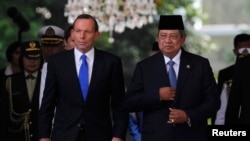SYDNEY —
Indonesia has announced that it will increase the number of live cattle the country receives from Australia. Exports were temporarily suspended by Canberra in 2011 because of allegations of cruelty in Indonesian slaughterhouses. Later on, the trade resumed following the introduction of new guidelines, but exports were well below previous levels.
Indonesia has agreed to buy more Australian cattle following a visit to Jakarta by new Prime Minister Tony Abbott.
The livestock industry has been a contentious issue between the Asia-Pacific neighbors since Australia’s former Labor government banned exports after revelations of mistreatment in Indonesian abattoirs in 2011. Exports have resumed, although they have been at less than half their previous levels.
Australian Agriculture Minister Barnaby Joyce says the new agreement is good for farmers.
“We have been in close negotiations about increasing the quota. It's great to see that this has now crystallized into an extra 53,000 head of cattle in this quota on top of the 46,000 that were already going,” said Joyce.
Canberra is also softening its position on Indonesia's plan to invest in pastoral land in northern Australia. Prior to the election, in September, senior Australian officials had denounced the plan as against Australia's national interests. They now insist that foreign investment will help economic growth in Australia’s under-developed north.
Another issue that has strained bilateral relations is asylum seekers. Jakarta had argued that Abbott’s plan to tow migrant boats back to Indonesia would violate its sovereignty. That controversial policy is now unclear; Canberra is now saying its navy will not force vessels all the way back to Indonesia, but would instead only be towed out of Australian waters.
“Can I just scotch this idea that the Coalition's policy is or ever has been tow-backs? Our policy, which we've repeated ‘til we're blue in the face, is that we reserve the right to turn boats around where it's safe to do so. Again, my object here is to stop the boats,” explained Abbott.
A steady stream of unauthorized arrivals has sailed into Australian waters in recent years. Abbott says that stemming the flow is not just about protecting the nation’s maritime borders, but is also about saving lives. Dozens of people have drowned already this year while attempting to make the hazardous crossing on unseaworthy boats from southern ports in Indonesia.
The Australian leader is now back home but will return to Indonesia next week for the Asia-Pacific Economic Cooperation summit on the resort island of Bali.
Indonesia has agreed to buy more Australian cattle following a visit to Jakarta by new Prime Minister Tony Abbott.
The livestock industry has been a contentious issue between the Asia-Pacific neighbors since Australia’s former Labor government banned exports after revelations of mistreatment in Indonesian abattoirs in 2011. Exports have resumed, although they have been at less than half their previous levels.
Australian Agriculture Minister Barnaby Joyce says the new agreement is good for farmers.
“We have been in close negotiations about increasing the quota. It's great to see that this has now crystallized into an extra 53,000 head of cattle in this quota on top of the 46,000 that were already going,” said Joyce.
Canberra is also softening its position on Indonesia's plan to invest in pastoral land in northern Australia. Prior to the election, in September, senior Australian officials had denounced the plan as against Australia's national interests. They now insist that foreign investment will help economic growth in Australia’s under-developed north.
Another issue that has strained bilateral relations is asylum seekers. Jakarta had argued that Abbott’s plan to tow migrant boats back to Indonesia would violate its sovereignty. That controversial policy is now unclear; Canberra is now saying its navy will not force vessels all the way back to Indonesia, but would instead only be towed out of Australian waters.
“Can I just scotch this idea that the Coalition's policy is or ever has been tow-backs? Our policy, which we've repeated ‘til we're blue in the face, is that we reserve the right to turn boats around where it's safe to do so. Again, my object here is to stop the boats,” explained Abbott.
A steady stream of unauthorized arrivals has sailed into Australian waters in recent years. Abbott says that stemming the flow is not just about protecting the nation’s maritime borders, but is also about saving lives. Dozens of people have drowned already this year while attempting to make the hazardous crossing on unseaworthy boats from southern ports in Indonesia.
The Australian leader is now back home but will return to Indonesia next week for the Asia-Pacific Economic Cooperation summit on the resort island of Bali.










